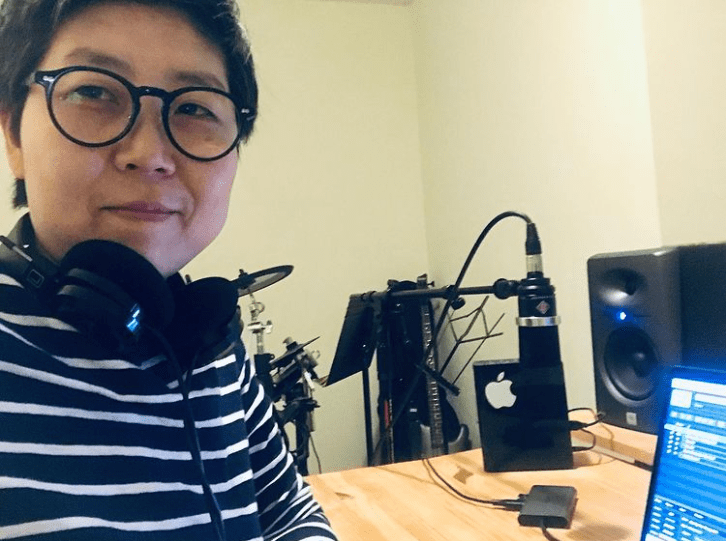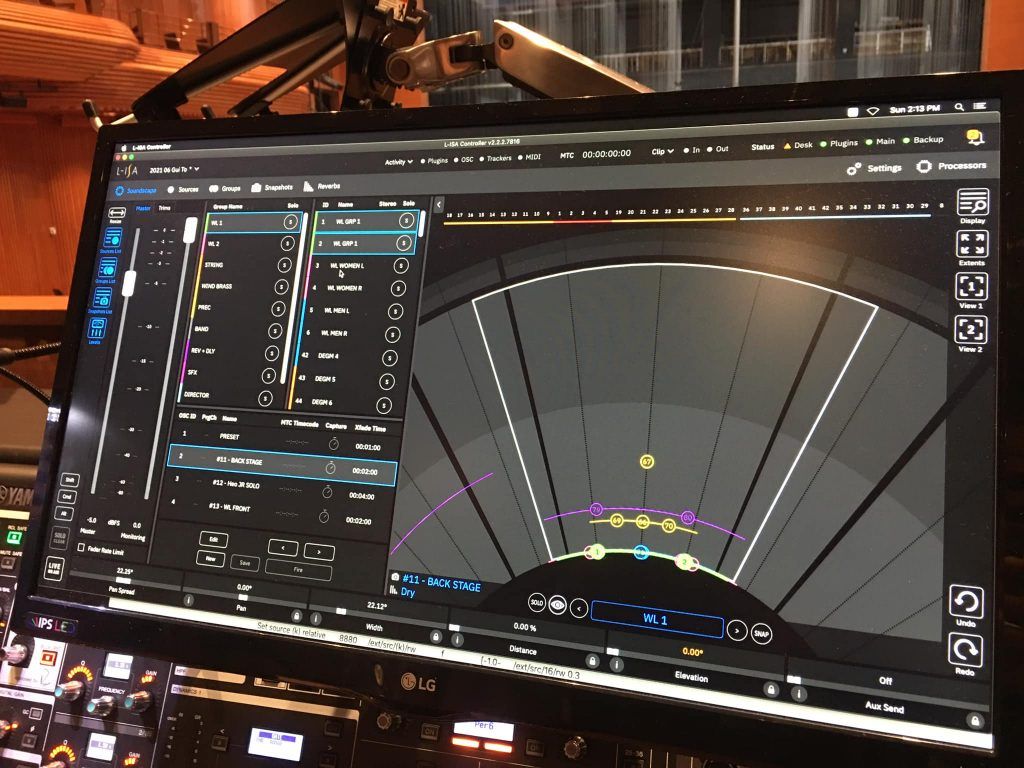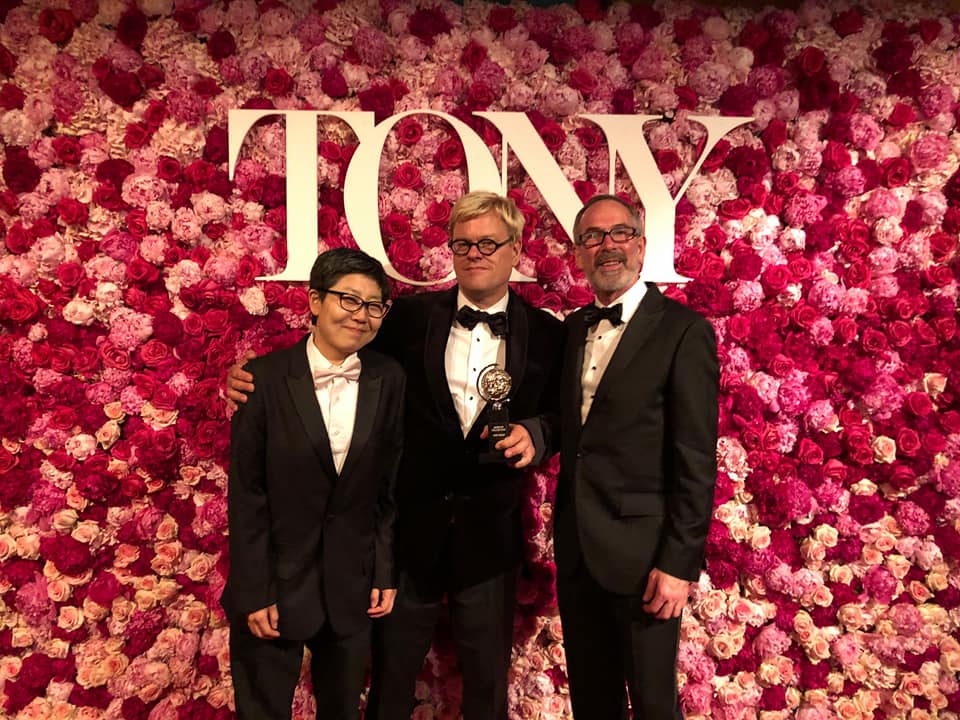Women in Pro Audio: Sun Hee Kil Women in Pro Audio: Sun Hee Kil...
“I love making art for people that they will enjoy or be moved by. When the audience watching one of the shows I’m working on cries or screams, it’s the best feeling ever. That’s when I’m the proudest of what I do— and why I do it. I think, If I could be born again, in the next life, I would do the same thing again.” – Sun Hee Kil
For this month’s Women in Pro Audio series, L-Acoustics had the pleasure of interviewing the talented, renowned, and adroit New York-based sound designer, engineer, and Professor of Sound, Sun Hee Kil.
Sunny (their byname and the correct pronunciation of Sun Hee) has an impressive history in theater and sound. After receiving a BA degree in Theatre & Film from Hanyang University, Seoul, South Korea, Sunny wanted to be a sound designer, but there weren’t any schools in South Korea. After being accepted at a graduate school, Sunny moved to the US and received an MFA in Sound Design from the University of Cincinnati, College-Conservatory of Music. Sunny then spent five years on the University of Central Oklahoma faculty. In 2014 Sunny was appointed assistant professor at the Department of Theatre Arts at SUNY New Paltz. Sunny’s sound design credits range from the musicals Caffeine at the Roppongi Blue Theatre in Tokyo, Japan, to Flipside at 59E59 in New York City. Manhattan Repertory Theatre featured Sunny’s original compositions in their production Removal. Solitary Musicians, a musical Sunny created and designed for 202 Productions in Seoul, was a finalist at the Uijeongbu International Music Theatre Festival and was invited to perform at the first Maronnier Festival in 2011.
Sunny’s accolades also include serving as an associate sound designer at the opening and closing ceremonies of the 2018 Pyeongchang Winter Olympics in South Korea, Bernhardt/Hamlet (Broadway), Choir Boy (TONY Best Sound Design), Dreamgirls Tour (Shanghai, China & Tokyo, Japan), Jim Henson’s Emmet Otter’s Jug-Band Christmas (New Victory); assistant sound design for The Rose Tattoo (Broadway), and Greater Clements (Lincoln Center Theater), and so much more.
The American Dream
Born in Busan, South Korea, Sunny’s story of defying cultural norms and achieving the “American Dream” is a testament to Sunny’s love for the theater arts.
“I originally had dreams of becoming a backup dancer when I was younger, but my body wouldn’t move like that!” That’s when Sunny tried everything in college: acting, directing, playwriting, working in the costume and scenery departments, but according to them, “I suffered so much because I just wasn’t good at any of that. I could have given up, but I didn’t. After graduation, I just followed my upper classmates and asked if I could work for them. I started as a PA and worked on a crew just to be in the industry. The only thing I hadn’t tried was sound because I had never learned. Then one day, a sound designer picked me up to be on his crew when I was a PA, and I started my sound engineer career by following him everywhere. From the beginning, it was so fun and challenging. He taught me so much and was so kind to me. That’s how I got started. I had to learn physics, math, and music as I studied theater. I’m constantly honing my skills even now!”
According to Sunny, sound engineering wasn’t offered as a professional trade in South Korea. “I wanted to learn sound design and engineering in a formal education setting, but we (still) don’t have theater sound design schools in South Korea. Also, I loved American musicals, but those musicals were translated into Korean for the Korean audience, and the content is so different. It’s not the same. I worked on Grease for three years, but the Korean high school students don’t and haven’t ever lived like the high school students in Grease. So why are we talking about something that’s not related to us? If I’m going to talk about somebody else’s society, I should just go, and do that there. That’s one reason why I moved to the US. And because I really love American musicals, I wanted to work on Broadway. So, I came here to the US, with my American Dream.”
Cultural Differences
When discussing generational and cultural differences, Sunny talks about how Korea’s societal life is so different from the US, “My father went to law school but became the CEO of a bank. My parents were very serious people, and for them, a job meant making money. They were also a part of the Boomer generation, so it’s different for them. The Korean War wiped out everything, so their generation, the Korean Baby Boomer generation, had to establish the whole country and bring the economy from zero to where we are now. So, art—art is considered an unnecessary, extra thing.
“When I went to college in the late 20th century, I was asked by family members why I wanted to do what the lowest class of people did. So that’s a big cultural problem. In Korea, since the beginning of human history until about 1950-ish, we never had a government. We had Kings and Dynasties, which meant you’d classify people by groups. The performers were all the way at the bottom of this class system throughout our history. My mother would say, ‘Oh, you want to be at the bottom of our society.’ But now, she loves that I’m the only person in my family who is always smiling and happy. All my siblings are also very serious. My sister, a medical doctor, says to me, ‘Sunny, you can make a mistake. I cannot ever make a mistake with what I do.’ They always have to pay attention and be serious. I guess we should do that too, but we don’t have people’s lives on our hands doing sound engineering,” Sunny says with a chuckle.
Barriers
When asked about the challenges during their career, Sunny was very candid. “I’m from South Korea, a more discriminatory country for women. Many people didn’t really listen to me or pay me very much heed there. As an Asian woman, here, in the US, my life really isn’t that much better. It takes time to prove myself. Even after 16 years of being here in the US, I still encounter language and cultural gaps whenever I get a new play or musical to work on.”
The “Why”
“I love making art for people that they will enjoy or be moved by. When the audience watching one of the shows I’m working on cries or screams, it’s the best feeling ever. That’s when I’m the proudest of what I do—and why I do it. I think, If I could be born again, in the next life, I would do the same thing again.”
Working with L-Acoustics
Yours, Anne is a loving and haunting musical about the renowned chronicle of two Jewish families hidden in a cramped garret in Amsterdam during the Nazi occupation. Sunny was able to work with L-Acoustics point source speakers mainly on Yours, Anne. “The sound was very impressive! So transparent and powerful. I turned into a big fan of L-Acoustics from that musical,” exclaims Sunny.
Currently, Sunny is working with L-ISA for the new ground-breaking musical, SUFFS, written by and featuring Shaina Taub. Showing at the Public Theater in New York, it’s a thrilling story of brilliant, passionate, and flawed suffragist women—”Suffs” as they called themselves—working against and across generational, racial, and class divides. SUFFS boldly explores the victories and failures of a fight for equality that is still far from over. When asked how Sunny enjoyed working with L-ISA: “It’s fantastic! I can hear every single instrument—fully and completely— anywhere in the house. I can also easily move sound objects, and it takes 1/10th of the time to optimize the sound for the room with L-ISA.”
Advice
Sunny’s advice to other women is simple: “Don’t be afraid of making mistakes. Don’t take anything personally and just move on. If somebody is nasty around you, scold them, and send them away! Oh! And get your hands on all of the equipment and try everything—actively! That’s the best way to learn. Also, learn physics, acoustics, and electricity! Learn all of the fundamentals first, then grow your knowledge. Also, some of the most important things I’ve learned, is that the show must go on, and there’s always a deadline. Even though it is not 100% satisfactory, you try all your best to finish up so the show can go on. Also, you can’t be ‘God’ of everything and work in a silo. You have to work together, and you have to trust other people and communicate. Everyone has their roles to play, and that’s the best part of being a theater artist.”
The Future of Sound
“In the future, I hope that sound technology will become a lot easier for sound engineers like me: for people who studied theater, and not physics. It seems to be heading that way, and I hope it continues. A future where we can use sound technology as an easy tool to design beautiful sound and art—that would be ideal.”


